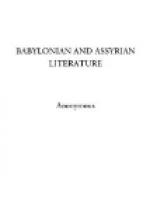in the grain thou liest down.
30 My knees are marching,
my feet are not resting:
with no wealth of thine own,
grain thou begettest for me.
34 A heifer am I;
to the cow I am yoked:
the plough-handle is strong;
lift it up, lift it up!
53 May he perform vengeance:
may he return also
(to him) who gives.
55 The marsh as though it were not he passes;[2]
the slain as though they were not ...[3] he makes good.
57 To the waters their god[4]
has returned:
to the house of bright things
he descended (as) an icicle:
(on) a seat of snow
he grew not old in wisdom.
....[3]
10 Like an oven
(which is) old
against thy foes
be hard.
15 Thou wentest, thou spoiledst
the land of the foe;
(for) he went, he spoiled
thy land, (even) the foe.
18 Kingship
in its going forth
(is) like a royal robe(?)
19 Into the river thou plungest, and
thy water (is) swollen
at the time:[5]
into the orchard thou plungest, and
thy fruit
(is) bitter.
34 The corn (is) high,
it is flourishing;
how
is it known?
The corn (is) bearded,
it is flourishing;
how
is it known?
42 The fruit of death
may the man eat,
(and yet) the fruit of life
may he achieve.
[Footnote 1: Lacuna.]
[Footnote 2: I have translated this line from the Accadian, the Assyrian text being wanting, and the words “a recent lacuna” being written instead. This makes it clear that the scribe who copied the tablet for Assur-bani-pal’s library did not understand Accadian and could not therefore supply the translation.]
[Footnote 3: Lacunae.]
[Footnote 4: This seems to be quoted from a hymn describing the return of Oannes to the Persian Gulf.]
[Footnote 5: See “Cuneiform Inscriptions of Western Asia,” vol. i. 25, 10.]
BABYLONIAN PUBLIC DOCUMENTS CONCERNING PRIVATE PERSONS
EDITED BY MM. OPPERT AND MENANT
These translations are taken from a French work published by Dr. Oppert and M. Menant; [Footnote: The title of the work is “Documents juridiques de l’Assyrie et de la Chaldee,” par J. Oppert et J. Menant, Paris, 1877.] the versions have been revised, in some essential points, for the “Records of the Past,” by Dr. Oppert, who holds himself personally responsible for the exact representation of the sense of these documents; but on account of the unusual difficulty of these texts, the reader may easily be convinced that for a long time yet, and particularly in details of minor importance, there will remain room enough for a conscientious improvement of all previous translations.




